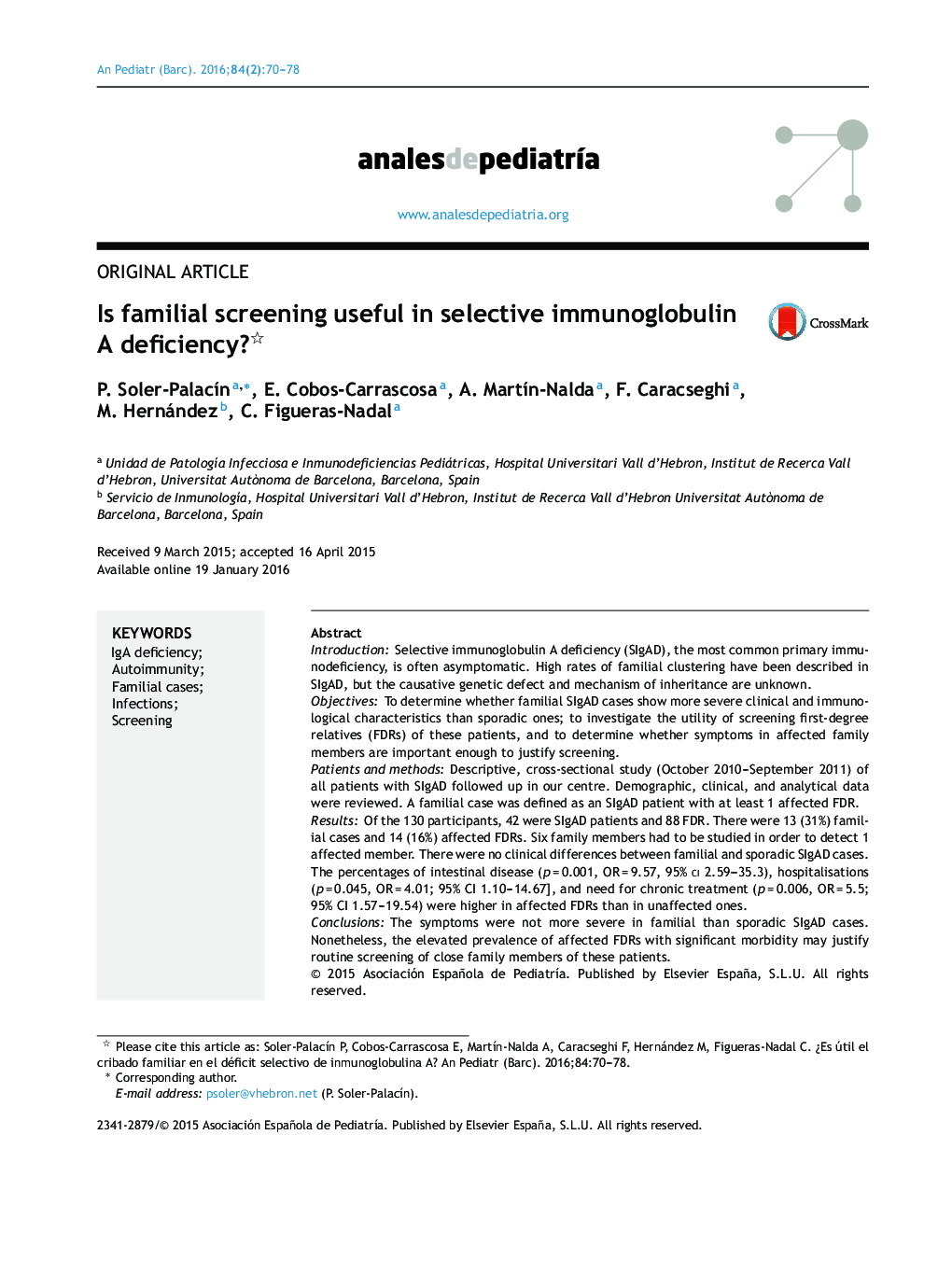| کد مقاله | کد نشریه | سال انتشار | مقاله انگلیسی | نسخه تمام متن |
|---|---|---|---|---|
| 4144981 | 1272579 | 2016 | 9 صفحه PDF | دانلود رایگان |
IntroductionSelective immunoglobulin A deficiency (SIgAD), the most common primary immunodeficiency, is often asymptomatic. High rates of familial clustering have been described in SIgAD, but the causative genetic defect and mechanism of inheritance are unknown.ObjectivesTo determine whether familial SIgAD cases show more severe clinical and immunological characteristics than sporadic ones; to investigate the utility of screening first-degree relatives (FDRs) of these patients, and to determine whether symptoms in affected family members are important enough to justify screening.Patients and methodsDescriptive, cross-sectional study (October 2010–September 2011) of all patients with SIgAD followed up in our centre. Demographic, clinical, and analytical data were reviewed. A familial case was defined as an SIgAD patient with at least 1 affected FDR.ResultsOf the 130 participants, 42 were SIgAD patients and 88 FDR. There were 13 (31%) familial cases and 14 (16%) affected FDRs. Six family members had to be studied in order to detect 1 affected member. There were no clinical differences between familial and sporadic SIgAD cases. The percentages of intestinal disease (p = 0.001, OR = 9.57, 95% CI 2.59–35.3), hospitalisations (p = 0.045, OR = 4.01; 95% CI 1.10–14.67], and need for chronic treatment (p = 0.006, OR = 5.5; 95% CI 1.57–19.54) were higher in affected FDRs than in unaffected ones.ConclusionsThe symptoms were not more severe in familial than sporadic SIgAD cases. Nonetheless, the elevated prevalence of affected FDRs with significant morbidity may justify routine screening of close family members of these patients.
ResumenIntroducciónEl déficit selectivo de IgA (DSIgA) es la inmunodeficiencia primaria más frecuente, siendo a menudo asintomática. Se ha descrito una elevada agregación familiar, sin conocerse el defecto genético causante ni su mecanismo hereditario.ObjetivosDefinir la utilidad del cribado de los familiares de primer grado de los pacientes con DSIgA valorando si los casos familiares presentan unas características clínicas e inmunológicas más graves que los casos esporádicos (CE) y si los familiares diagnosticados de DSIgA presentan sintomatología clínica significativa para justificar su cribado.Pacientes y métodosEstudio transversal descriptivo (octubre del 2010-septiembre del 2011) de todos los pacientes con DSIgA controlados en nuestro centro, con revisión de datos demográficos, clínicos y analíticos. Se consideró como caso familiar (CF) todo aquel con al menos un familiar de primer grado (FPG) con DSIgA.ResultadosDe los 130 participantes, 42 eran pacientes con DSIgA y 88 FPG. Se diagnosticaron 13 CF (31%), 29 CE (69%) y 14 (16%) FPG enfermos (FPG-E). El número necesario a analizar para encontrar un FPG-E fue de 6 familiares. No hubo diferencias clínicas entre los pacientes. Hubo una proporción mayor de patología intestinal (p = 0,001, OR = 9,57, IC del 95%, 2,59–35,3), ingresos (p = 0,045, OR = 4,01; IC del 95%, 1,10–14,67) y necesidad de tratamiento crónico (p = 0,006, OR = 5,5; IC del 95%, 1,57–19,54) en los FPG-E con respecto a los FPG sanos.ConclusionesA pesar de no encontrar más complicaciones clínicas en los CF de DSIgA, la elevada prevalencia de familiares afectados con afectación clínica significativa podría justificar la realización sistemática de estos programas de cribado.
Journal: Anales de Pediatría (English Edition) - Volume 84, Issue 2, February 2016, Pages 70–78
